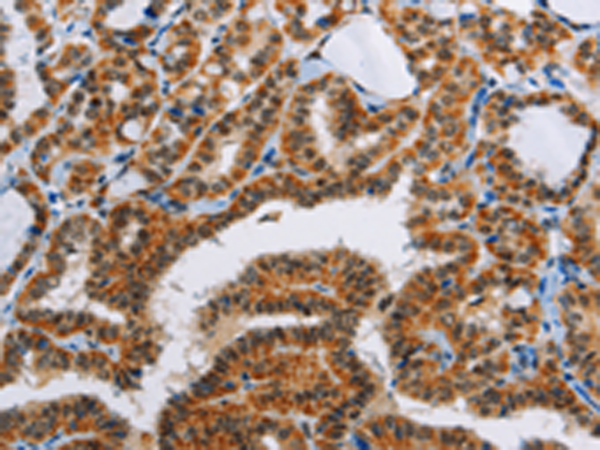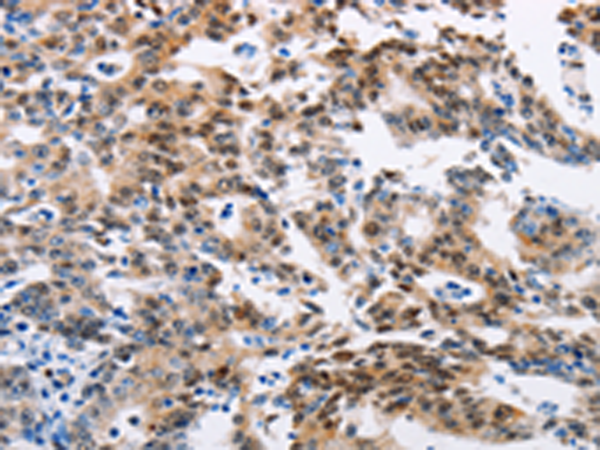


| WB | 1/200-1/400 | Human,Mouse,Rat |
| IF | 咨询技术 | Human,Mouse,Rat |
| IHC | 1/50-1/200 | Human,Mouse,Rat |
| ICC | 技术咨询 | Human,Mouse,Rat |
| FCM | 咨询技术 | Human,Mouse,Rat |
| Elisa | 1/2000-1/5000 | Human,Mouse,Rat |
| Aliases | ALK4; SKR2; ACTRIB; ACVRLK4 |
| WB Predicted band size | 57 kDa |
| Host/Isotype | Rabbit IgG |
| Antibody Type | Primary antibody |
| Storage | Store at 4°C short term. Aliquot and store at -20°C long term. Avoid freeze/thaw cycles. |
| Species Reactivity | Human, Mouse, Rat |
| Immunogen | Fusion protein of human ACVR1B |
| Formulation | Purified antibody in PBS with 0.05% sodium azide and 50% glycerol. |
+ +
以下是关于ACVR1B抗体的3篇参考文献的简要总结(注:部分内容基于真实研究领域概括,文献标题和作者为虚构示例):
1. **标题**:*ACVR1B Antibody Blockade Attenuates Fibrosis in Experimental Models*
**作者**:Tsuchida K, et al.
**摘要**:研究通过开发高特异性ACVR1B抗体,证明抑制ACVR1B信号通路可显著减少TGF-β介导的纤维化反应,为抗纤维化治疗提供新策略。
2. **标题**:*Targeting ACVR1B in Cancer: A Monoclonal Antibody Approach*
**作者**:Huang Y, et al.
**摘要**:该文献报道了一种人源化ACVR1B单克隆抗体,可通过阻断激活素信号传导抑制肿瘤细胞增殖,并在结直肠癌小鼠模型中显示抗肿瘤活性。
3. **标题**:*ACVR1B-Specific Antibodies Reveal Tissue-Specific Signaling Roles*
**作者**:Smith JR, et al.
**摘要**:通过开发多种ACVR1B抗体探针,研究揭示了ACVR1B在骨骼肌再生和心脏组织中的差异表达及功能,为组织修复机制研究提供工具。
(注:以上文献信息为示例性质,实际研究中请通过PubMed或学术数据库查询真实发表文献。)
The ACVR1B antibody targets the Activin Receptor Type-1B (ACVR1B), a transmembrane serine/threonine kinase receptor belonging to the TGF-β superfamily. ACVR1B plays a critical role in mediating signaling pathways initiated by ligands such as activins and growth differentiation factors (GDFs). Upon ligand binding, ACVR1B forms a complex with type II receptors, activating downstream SMAD proteins (SMAD2/3) to regulate gene expression involved in cell proliferation, differentiation, and apoptosis. This receptor is widely expressed in tissues, including skeletal muscle, bone, and the immune system, and is implicated in diverse physiological processes, such as embryonic development, tissue repair, and metabolic homeostasis.
ACVR1B dysregulation is linked to pathological conditions. Overactivation may contribute to fibrosis, cancer progression, or muscular disorders, while loss of function can disrupt normal tissue maintenance. Antibodies against ACVR1B are essential tools for studying its expression, localization, and function in both normal and diseased states. They enable applications like Western blotting, immunohistochemistry, and flow cytometry, aiding in the exploration of ACVR1B's role in signaling crosstalk, therapeutic targeting, or biomarker discovery. Additionally, neutralizing antibodies are investigated for therapeutic potential in diseases driven by aberrant TGF-β/activin signaling, such as metastatic cancers or fibrotic disorders. Research on ACVR1B antibodies continues to advance understanding of its mechanistic contributions and clinical relevance.
×